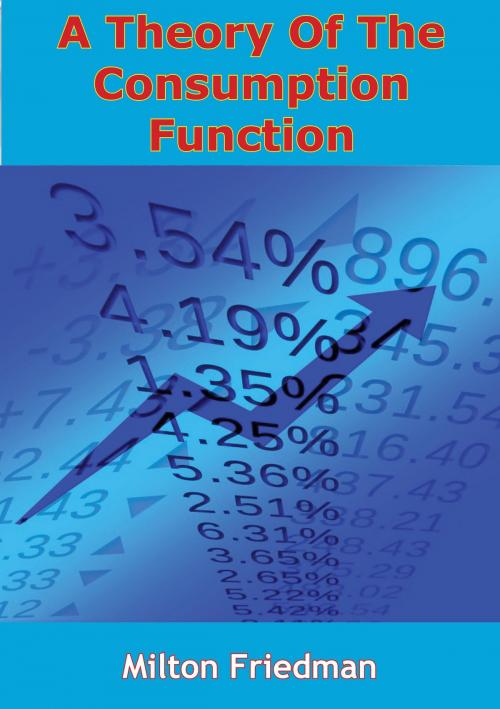A Theory Of The Consumption Function
Business & Finance, Finance & Investing, Banks & Banking, Investments & Securities| Author: | Milton Friedman | ISBN: | 9781786258915 |
| Publisher: | Golden Springs Publishing | Publication: | March 28, 2016 |
| Imprint: | Golden Springs Publishing | Language: | English |
| Author: | Milton Friedman |
| ISBN: | 9781786258915 |
| Publisher: | Golden Springs Publishing |
| Publication: | March 28, 2016 |
| Imprint: | Golden Springs Publishing |
| Language: | English |
What is the exact nature of the consumption function? Can this term be defined so that it will be consistent with empirical evidence and a valid instrument in the hands of future economic researchers and policy makers? In this volume a distinguished American economist presents a new theory of the consumption function, tests it against extensive statistical J material and suggests some of its significant implications.
Central to the new theory is its sharp distinction between two concepts of income, measured income, or that which is recorded for a particular period, and permanent income, a longer-period concept in terms of which consumers decide how much to spend and how much to save. Milton Friedman suggests that the total amount spent on consumption is on the average the same fraction of permanent income, regardless of the size of permanent income. The magnitude of the fraction depends on variables such as interest rate, degree of uncertainty relating to occupation, ratio of wealth to income, family size, and so on.
The hypothesis is shown to be consistent with budget studies and time series data, and some of its far-reaching implications are explored in the final chapter.
"…the most influential economist of the second half of the 20th century...possibly of all of it.”—The Economist
"Friedman argued that the best way to make sense of saving and spending was not, as Keynes had done, to resort to loose psychological theorizing, but rather to think of individuals as making rational plans about how to spend their wealth over their lifetimes...The details are a bit technical, but Friedman’s ‘permanent income hypothesis’ and the Ando-Modigliani ‘life cycle model’ resolved several apparent paradoxes about the relationship between income and spending, and remain the foundations of how economists think about spending and saving to this day."—Paul Krugman, New York Times
What is the exact nature of the consumption function? Can this term be defined so that it will be consistent with empirical evidence and a valid instrument in the hands of future economic researchers and policy makers? In this volume a distinguished American economist presents a new theory of the consumption function, tests it against extensive statistical J material and suggests some of its significant implications.
Central to the new theory is its sharp distinction between two concepts of income, measured income, or that which is recorded for a particular period, and permanent income, a longer-period concept in terms of which consumers decide how much to spend and how much to save. Milton Friedman suggests that the total amount spent on consumption is on the average the same fraction of permanent income, regardless of the size of permanent income. The magnitude of the fraction depends on variables such as interest rate, degree of uncertainty relating to occupation, ratio of wealth to income, family size, and so on.
The hypothesis is shown to be consistent with budget studies and time series data, and some of its far-reaching implications are explored in the final chapter.
"…the most influential economist of the second half of the 20th century...possibly of all of it.”—The Economist
"Friedman argued that the best way to make sense of saving and spending was not, as Keynes had done, to resort to loose psychological theorizing, but rather to think of individuals as making rational plans about how to spend their wealth over their lifetimes...The details are a bit technical, but Friedman’s ‘permanent income hypothesis’ and the Ando-Modigliani ‘life cycle model’ resolved several apparent paradoxes about the relationship between income and spending, and remain the foundations of how economists think about spending and saving to this day."—Paul Krugman, New York Times




![Cover of the book John Bell Hood’s Division In The Battle Of Chickamauga: A Historical Analysis [Illustated Edition] by Milton Friedman](https://www.kuoky.com/images/2014/august/300x300/9781782894919-PTun_300x.jpg)



![Cover of the book The Vicksburg Campaign, November 1862-July 1863 [Illustrated Edition] by Milton Friedman](https://www.kuoky.com/images/2015/november/300x300/9781782899365-GJ69_300x.jpg)
![Cover of the book Staff Ride Handbook For The Battle Of Perryville, 8 October 1862 [Illustrated Edition] by Milton Friedman](https://www.kuoky.com/images/2014/august/300x300/9781782895312-4tZA_300x.jpg)




![Cover of the book Staff Ride Guide - The Battle Of First Bull Run [Illustrated Edition] by Milton Friedman](https://www.kuoky.com/images/2014/august/300x300/9781782894599-MCut_300x.jpg)
![Cover of the book Second Bull Run Staff Ride: Briefing Book [Illustrated Edition] by Milton Friedman](https://www.kuoky.com/images/2014/august/300x300/9781782898597-unEf_300x.jpg)